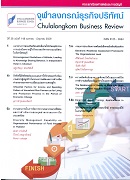ความสัมพันธ์ของความพึงพอใจในคุณภาพชีวิตการทำงานต่อพันธะสัญญาทางใจและความตั้งใจลาออก
Main Article Content
Abstract
บทคัดย่อ
งานวิจัยนี้มีวัตถุประสงค์เพื่อศึกษาความสัมพันธ์ระหว่างปัจจัยต่างๆ ของความพึงพอใจในคุณภาพชีวิตการทำงาน (Quality of Work Life) พันธะสัญญาทางใจในงาน (Work Engagement) และความตั้งใจลาออก (Intention to Quit) ของบุคลากร ซึ่งเป็นตัวแปรที่ตอบสนองของปัจจัยดังกล่าว ภายใต้แนวคิดของโมเดลความต้องการของงานและปัจจัยที่เอื้อต่อการทำงาน (JD-R Model) งานวิจัยนี้เก็บข้อมูลจากกลุ่มตัวอย่างบุคลากรทางด้านการแพทย์และพยาบาล จำนวน 422 ตัวอย่าง ผลการวิจัยพบว่าพันธะสัญญาทางใจในงานมีความสัมพันธ์ในทางตรงกันข้ามกับความตั้งใจลาออก เมื่อพิจารณาปัจจัยเชิงสาเหตุที่ส่งผลกระทบต่อพันธะสัญญาทางใจในงาน พบว่าความพึงพอใจในคุณภาพชีวิตการทำงานมีความสัมพันธ์ในเชิงบวกต่อพันธะสัญญาทางใจในงาน อย่างไรก็ตาม เมื่อควบคุมตัวแปรที่เกี่ยวกับความพึงพอใจในคุณภาพชีวิตการทำงานด้านต่างๆ ในสมการถดถอยแบบเชิงชั้น ผลการวิจัยกลับพบว่าพันธะสัญญาทางใจในงานไม่ได้ส่งอิทธิพลเพิ่มเติมต่อความตั้งใจลาออกของบุคลากรอย่างมีนัยสำคัญในสมการถดถอยดังกล่าว มีเพียง 3 องค์ประกอบของความพึงพอใจในคุณภาพชีวิตการทำงาน ได้แก่ Social Relevance, Adequate and Fair Compensation และ Work and Life Space มีความสัมพันธ์ในทางตรงกันข้ามกับความตั้งใจลาออกอย่างมีนัยสำคัญ ซึ่งผลการวิจัยเป็นข้อมูลที่เป็นประโยชน์ต่อการออกแบบการแทรกแซงเพื่อการพัฒนาองค์กรให้สอดคล้อง เหมาะสม และก่อให้เกิดประสิทธิภาพแก่องค์กรต่อไป
คำสำคัญ: คุณภาพชีวิตการทำงาน; พันธะสัญญาทางใจ; ความตั้งใจลาออก
Abstract
This empirical study aims to investigate the relationship of quality of work life, work engagement and intention to quit under the well-known concept of JD-R model. Based on the data obtained through a questionnaire survey of 422 healthcare professionals, the results indicated that work engagement had a negative relationship with intention to quit. Quality of work life was also a significant predictor of work engagement. However, when all factors of quality of work life variable were controlled in the hierarchical regression, work engagement related variables did not contribute additional variance to the regression equation. Only three quality of work life factors namely social relevance, adequate and fair compensation as well as work and life space were negatively related to intention to quit. Implications of these results are discussed and organizational development interventions to improve organizational effectiveness are recommended.
Keywords: Quality of Work Life; Work Engagement; Intention to Quit.
Article Details
Opinions and discussions in papers published by the Creative Business and Sustainability Journal (CBSJ) are deemed as personal opinions and the responsibility of the writers. They are not the opinions or responsibility of the Chulalongkorn Business School of Chulalongkorn University.
Papers, content, information etc. appearing in the Journal are deemed to be the copyright property of the Chulalongkorn Business School of Chulalongkorn University. Anybody or any organization that wishes to publish any part of them or use them in any way must obtain written permission from the Chulalongkorn Business School, Chulalongkorn University.


